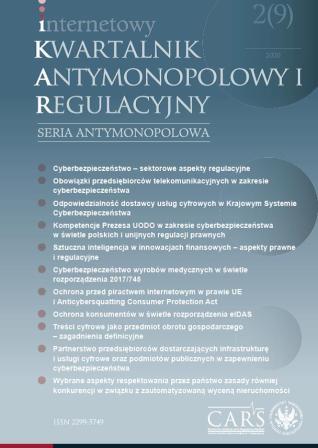Treści cyfrowe jako przedmiot obrotu gospodarczego – zagadnienia definicyjne
Digital content as a subject of economic trading – definition issues
Author(s): Katarzyna Chałubińska-JentkiewiczSubject(s): Civil Law, International relations/trade, Law on Economics, ICT Information and Communications Technologies, Administrative Law
Published by: Wydawnictwo Naukowe Wydziału Zarządzania Uniwersytetu Warszawskiego
Keywords: Digital content; intellectual property; digital content delivery; digitization; consumer rights;
Summary/Abstract: ‘Digital content’ is yet another notion requiring a precise definition. Initially the definition of digital content was included in the proposal of a Directive of the European Parliament and of the Council on certain aspects concerning contracts for the online and other distance sales of goods. In this context, ‘digital content’ signifies data generated and delivered in digital form, regardless of whether its properties had been defined by the consumer, and those include visual, audio, photographic or written, digital games, software and digital content allowing personalization of existing devices or software. Of course, this definition can be set out in various ways by the national legislator. For example, the Polish Act of 30 May 2014 on consumer rights designates ‘digital content’ as a new category of ‘product/ merchandise’. According to article 2 section 5 of this Act, ‘digital content’ is understood as data produced and delivered in a digital form. So far, the law referred solely to liability of delivering physical products to the consumer of the services provided. Currently, digital content is a crucial and major element of everyday interactions between web users. Digital content is data which, with the use of appropriate software and devices, can be processed into information, for example information stored in electronic files such as eBooks, computer programs, mobile phone applications, audio files, films and images. Disseminating digital content via audiovisual media services is trans-border by definition, which is advantageous for the producers, creators and beneficiaries and above all, the consumers – recipients and users of the service. Digitalization and sharing digital content are contributing to a global increase in access to reliable sources of information as well as previously neglected resources, including those remaining in the public domain and new resources produced based on those archives. Naturally, digital content requires protection and securing ownership online. In the age of modern technology developments, intellectual property – a unique type of property – gains particular importance. Its protection entails a crucial developmental aspect which relates not only to the characteristics of the protected creative works themselves, in many various domains of human activity, but also to the strictly defined financial and moral benefits to which the entity is entitled to
Journal: internetowy Kwartalnik Antymonopolowy i Regulacyjny (iKAR)
- Issue Year: 9/2020
- Issue No: 2
- Page Range: 111-128
- Page Count: 18
- Language: Polish

